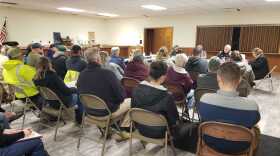Dozens of people in the Town of Stella in Oneida County will need to replace their wells after testing revealed some of the highest levels of PFAS contamination in the country.
The City of Rhinelander received $1.6 million in federal funding to address its PFAS issues.
As more communities test and find PFAS in their drinking water, it’s becoming clear that remediation will be costly.
“Billions will be spent on this issue, trillions nationwide by the time we get it cleaned up,” said Senator Mary Felzkowski at a recent listening session in Rhinelander.
She says the $125 million set aside in the most recent state budget is just the beginning of what the state will need to invest to address PFAS.
This week, the State Senate passed a bill that would get that money out to people affected in the form of grants.
Those in favor of the bill say it protects landowners, ut Governor Evers’ spokesperson told the Associated Press that the Governor doesn’t support the bill because it would limit the state Department of Natural Resources’ ability to order landowners to clean up contamination.
Wisconsin’s Conservation Voters opposes it for similar reasons.
Peter Burress is the organization’s Government Affairs Manager. WXPR spoke with him before the Senate passed the bill.
“We are very concerned that some of the changes more so reflect them listening to groups like Wisconsin Manufacturing and Commerce than the folks across the state who are really dealing with the impact the health-related impact of PFAS head on,” he said.
The DNR wouldn’t be able to take enforcement action against anyone who takes grant money.
Burress says the bill is a loophole for polluters and shifts responsibility for contamination from the polluters to Wisconsin taxpayers.
“We're concerned that in the future, a Department of Natural Resources under a different administration that could potentially be friendly to corporate polluters who are responsible for this contamination, could really just qualify them as innocent landowners, and then shift responsibility from those responsible onto Wisconsin taxpayers,” said Burress.
He wants to see a bill passed to get funding to people who need it and table the accountability discussion for another day.
“We can disagree on those pieces. We shouldn't let those pieces get in the way of getting the funding out the door,” said Burress. “That's what's happening right now.”
Burress says Wisconsin Conservation Voter’s would also like to see legislation that works towards long-term prevention and more public health-based standard.
They’d also like to see the phase out of these chemicals and support for research into remediation.







